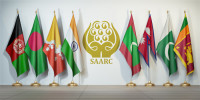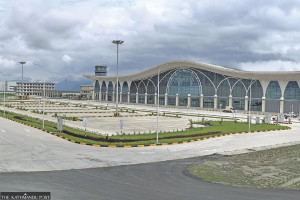Opinion
Commitments of New Force Nepal
It’s a political movement that will build on the latest achievements in the realms of knowledge and science
In the midst of existing popular brands of parties in Nepal like the NC, CPN-UML, UCPN-M etc., a frequently asked question is: What’s the rationale for Naya Shakti (new force)? What is its ideology? Is it leftist or rightist? The idea is not to add one more party of the old genre but to create a new political paradigm as per the demands of a new era in Nepali history. The New Force Nepal (NFN) will not only be a political party but an alternative political movement. It shall be a socialism-oriented left-democratic force which will go beyond the traditional ideological boundaries. Its main commitments, in the form of five “Sa”, are as follows:
Independence and sovereignty
Protection and advancement of Nepal’s sovereignty and territorial integrity is our foremost commitment. We shall forever keep the complete sovereignty and freedom of the country and its people at the forefront. Through skillful management of the peculiar geo-strategic location of Nepal—situated between two big nations, India and China—we will exercise a national security and foreign policy that corresponds to the contemporary era, and that will contribute to the nation’s dignity and honour. For this, we shall follow a policy of utilising benefits from the rapid economic development of the two neighboring countries and make Nepal prosperous and intra-dependent. Instead of the old reading of Nepal as a ‘yam between two boulders’, we shall create a new Nepal that is a ‘dynamic bridge between two developing neighbours’. By strengthening internal national unity and economic prosperity, we shall espouse ‘progressive nationalism’ that aims to end our longstanding dependency. We shall contribute to world peace by maintaining equal and friendly relationship based on mutual benefits with all countries.
Equitable prosperity
A primary aim of the NFN is to transform Nepal into a prosperous and happy nation in our own lifespan. We want an end to absolute poverty and unemployment within 10 years, a medial development level for the country within 20 years and the pinnacle of prosperity within 30 years. We will pursue a policy of economic growth wedded with employment generation and social justice. For this, we—together with inputs from experts and the private sector—shall prepare a programme of economic development and prosperity, and shall implement it with speed and intensity. Moreover, we shall espouse a unique and realistic development policy that will ensure that the fruits of development reach all class, region and community in an equitable manner, which is based on an appropriate collaboration between the state and the private sector, which contributes to the balanced development of agriculture, industry and service sectors, and which incorporates fairly both labour and technology as well as domestic and international investment. Environmental protection and sustainable development will be the cornerstones of our policy. Attention will also be paid to people’s happiness and peace alongside their material prosperity. We will not indulge in hollow sloganeering and rhetoric; we believe in actual practice.
Participatory democracy
Another important commitment of the NFN is to transform the existing formal and ritualistic exercise of democracy, both within the party and the state, into an inclusive, proportional representative and participatory democracy that reflects the country’s peculiar situation and demands. We will be fully committed to the foundational principles of republicanism, federalism, secularism and inclusive proportional representative democracy. We will ensure inclusive proportional representation of varied class, nationality, region, gender and other marginalised communities from the himalayan, hilly and Tarai-Madhes belts in all party and state organs. We will pay special attention to the representation of youths in all areas. To end the prevailing centralised, autocratic character of parties and the state, we shall practice direct and participatory democracy. To end the hegemony and abuse of power by some individuals or families, we shall practice the principles of one person, one executive post, and two tenures, with the right to reject to recall elected representative.
We believe that the mixed electoral system and parliamentary system of rule that have been adopted in the current Nepali constitution will not bring political stability in Nepal, without which it is impossible to achieve economic development and prosperity. The above-mentioned systems need to be changed, for which the constitution must be amended. For this, the NFN will conduct a nationwide campaign for the separation of legislative and executive functions so that there will be proportional electoral system for the legislative assembly and direct electoral system for the executive.
Good Governance
The main elements that shall distinguish the NFN from other old parties are good governance and moral conduct. This is important because politics and corruption have become synonymous in Nepal today. Many surveys have shown that political parties and politicians are some of the most corrupt institutions or people in the country. Similarly, the bureaucracy, judiciary and security bodies have become hubs of corruption and unaccountability. Therefore, one of the major responsibilities of the NFN will be to rescue politics and public services from the quagmire of corruption, and uphold good governance and good conduct. To achieve this, first, we want to redefine politics as a way of conducting voluntary social service and not as some private career-building project. We shall maintain transparency, accountability, rule of law and zero tolerance to corruption. If any cases of corruption, misconduct or fraudulence are found and proved against any of our leaders or cadres, immediate action shall be taken against them. A simple lifestyle, humble behaviour, respect for labour, social harmony and progressive culture shall be the cultural identity of the NFN. To evaluate our conduct and to run enquiries on public allegations against our leaders or carders, independent and impartial ombudsman groups will be formed at different levels of our party. The decisions of these groups shall be unequivocally accepted and implemented by the party. We will do as we speak—selflessly, in favour of the people.
Enhanced socialism
Nepal has only recently entered into a capitalist stage after battling out of an autocratic unitary feudal system. However, feudal remnants still pervade our economic, social and cultural arenas. Therefore, our immediate task is to eliminate these feudal remnants, develop national industrial capital and rectify bourgeois democracy. However, we acknowledge that it is not an easy or simple task for a small underdeveloped nation like ours to build an independent national industrial capitalism, given the current world schema of globalised monopoly capitalism. In such a context, capitalism is more likely to be characterised by dependency and cronyism that increase class and regional inequality. Therefore, it is important to transform the nascent national industrial capitalism into the path of socialism. The state must be responsible for guaranteeing education and health services for all and for providing social security. However, a repetition or reproduction of state-controlled or autocratic socialist models of the 20th century is impossible today. Therefore, in accordance with the demands of the 21st century and the specificities of Nepal, the NFN will develop a new model of enriched socialism. This attempt will be based on furthering the methodology and principle of dialectical and historical materialism as propounded by Marx and developed by other thinkers. This will not be a socialism that is enforced from above or one that distributes poverty, nor will it be an autocratic system that is centred on an individual. Rather, this socialism will be built from below, will distribute prosperity, will unfetter the individual’s initiative, and will be participatory. The NFN’s immediate task will be to focus on the development of national industrial capital and lay the foundations of enriched socialism. The NFN is not a non-ideological group of people. Rather, it is a transformative, progressive force that will embrace and build upon human being’s latest achievements in the realms of knowledge and science.
Bhattarai, the co-ordinator of the Naya Shakti Nepal, is former prime minister of Nepal




 19.12°C Kathmandu
19.12°C Kathmandu









